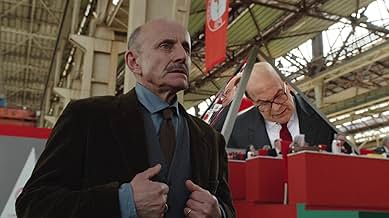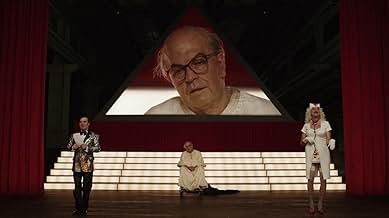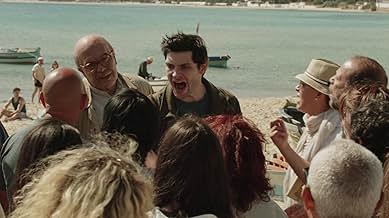Hammamet
- 2020
- 2 h 6 min
AVALIAÇÃO DA IMDb
5,8/10
1,9 mil
SUA AVALIAÇÃO
O último ano de vida do Bettino Craxi, um dos mais importantes e controversos líderes italianos dos anos 80.O último ano de vida do Bettino Craxi, um dos mais importantes e controversos líderes italianos dos anos 80.O último ano de vida do Bettino Craxi, um dos mais importantes e controversos líderes italianos dos anos 80.
- Direção
- Roteiristas
- Artistas
- Prêmios
- 8 vitórias e 18 indicações no total
Avaliações em destaque
Who controls the present controls the past, Orwell wrote in 1984.This movie is a courageous attempt to restore Bettino Craxi as a human being, after having been politically destroyed by left-wing judges in the only judiciary-driven coup of Italian history. In itself is not much more than a documentary but Favino puts such heart and soul into his character that makes the movie enjoyable and didactic.
If you grant (a lot of) indulgence to the controversial protagonist, you'll enjoy this nostalgic movie (Amelio is the right director), taste some subtleties, and praise the great performance of the lead actor - "adesso li fa tutti Favino", and for a very good reason - and the whole cast.
On the other side, even forgetting about history, you'll also notice the flaws: the most important political facts are just fainted, the identities are hidden (even ridiculously, as for Craxi's sons), there's no real plot (the Vincenzo's son escamotage does not work) which contribuites to the image of a insufferable crumbling king
Main actor is great, movie has some nice parts but the pace is slow and expecially at the end loses grip. Maybe it needs a better cut. How accurate its' historically is also a nice question....
Uscito oggi. Visto al cinema.
Il film è fatto bene e le due ore scorrono veloci senza sosta. Tratta una parte della vita di Craxi che vi lascio scoprire quando andrete al cinema.
Favino è un attore dalle capacità ormai eccelse ed è un peccato che sia italiano, essendo il cinema italiano poco quotato all'estero: se fosse americano o francese avrebbe già vinto un Oscar o premi di rilevanza simile.
Gli altri attori ruotano tutti attorno a Craxi e quindi sembrano tutti secondari.
Il film è ben diretto, senza pause, ottima fotografia, ottime musiche.
Speriamo vinca molti premi.
Il film è fatto bene e le due ore scorrono veloci senza sosta. Tratta una parte della vita di Craxi che vi lascio scoprire quando andrete al cinema.
Favino è un attore dalle capacità ormai eccelse ed è un peccato che sia italiano, essendo il cinema italiano poco quotato all'estero: se fosse americano o francese avrebbe già vinto un Oscar o premi di rilevanza simile.
Gli altri attori ruotano tutti attorno a Craxi e quindi sembrano tutti secondari.
Il film è ben diretto, senza pause, ottima fotografia, ottime musiche.
Speriamo vinca molti premi.
If nothing else, this is one movie with "character".
Before sitting down to watch its first airing on Rai3, I peeked at the IMDb comments and the score, only to get confused. The awards and the praise just did not match with the overall score which was close to a 5. And the reviews suggested that one would not get much taste out of "Hammamet" unless one was particularly interested and invested in the history of the Italian left.
Well, I disagree.
I barely remembered the name Craxi and had no idea he had spent his last days in Tunisia. A quick search provided me with enough knowledge and trivia to place the narrative where it was intended to be.
I, too, am one who would enjoy to find the crucial foundations of a story (or a portrait) right within the movie itself, but let's face it: Times have changed. The way we access and enjoy movies has changed. The viewer may at times be expected to interact with the film in ways that are not limited to looking at a screen.
With a bit of leg work, one can get into Hammamet, which is quite rewarding given that the director has really given thought on how to construct solid scenes focusing all the time on the contrast between how the world sees a man and how the man interprets his very own self.
The director has made the touches to convert Craxi into a cinematical creature, a man of hopeless yet endless power plays, not as unlikable as actual moguls like Harvey Weinstein but somewhat more crude-yet-real than Citizen Kane.
A bit of abstraction, some escapism and lots of ego - be they capitalist or socialist, this is how almost any notable man can be portrayed.
The fact that this movie was shot only 20 years after Craxi's death makes it more interesting. It is a "period piece" in a way, but not so much as the gap between the actual thing and its cinematic interpretation ain't huge.
I particularly enjoyed the choices of songs used in the movie. The scene where his son played the guitar and song "Piazza Grande" was a delight. Delicate choice of Italian culture from not so long ago, including even tidbits from dubbed Hollywood movies he watches on Italian channels via satellite.
Reckless bravery... This is what I would call the director's choice on certain things, and also what I would call Craxi's involvement with money and politics.
The revenge-seeking son of his late friend disappears in the desert, just like that, defeating the very basic concepts of time and space? Really? That was a dare.
Reducing crimes of fraud into mere "naughtiness" by starting and ending the film with images of a child Craxi? Wow! Name a politician of my own times, and I'd get furious with such whitewashing! Yet, as a simple and functioning explanation to whatever complicated stuff went on in real life, yes, I will take it within the context of this film!
The Fellini-esque scarf worn by the protagonist as he walks barefoot on top of the Duomo in his dream, the way his daughter takes him to his lover... My, those were pretty notable scenes in very different ways.
As the doctor says regarding another character: "I malati di mente non guariscono perché non sono malati." (Mental illnesses don't get cured because they are not illnesses.)
This was a strange, powerful and kind of arrogant film. I'm glad I saw it.
Before sitting down to watch its first airing on Rai3, I peeked at the IMDb comments and the score, only to get confused. The awards and the praise just did not match with the overall score which was close to a 5. And the reviews suggested that one would not get much taste out of "Hammamet" unless one was particularly interested and invested in the history of the Italian left.
Well, I disagree.
I barely remembered the name Craxi and had no idea he had spent his last days in Tunisia. A quick search provided me with enough knowledge and trivia to place the narrative where it was intended to be.
I, too, am one who would enjoy to find the crucial foundations of a story (or a portrait) right within the movie itself, but let's face it: Times have changed. The way we access and enjoy movies has changed. The viewer may at times be expected to interact with the film in ways that are not limited to looking at a screen.
With a bit of leg work, one can get into Hammamet, which is quite rewarding given that the director has really given thought on how to construct solid scenes focusing all the time on the contrast between how the world sees a man and how the man interprets his very own self.
The director has made the touches to convert Craxi into a cinematical creature, a man of hopeless yet endless power plays, not as unlikable as actual moguls like Harvey Weinstein but somewhat more crude-yet-real than Citizen Kane.
A bit of abstraction, some escapism and lots of ego - be they capitalist or socialist, this is how almost any notable man can be portrayed.
The fact that this movie was shot only 20 years after Craxi's death makes it more interesting. It is a "period piece" in a way, but not so much as the gap between the actual thing and its cinematic interpretation ain't huge.
I particularly enjoyed the choices of songs used in the movie. The scene where his son played the guitar and song "Piazza Grande" was a delight. Delicate choice of Italian culture from not so long ago, including even tidbits from dubbed Hollywood movies he watches on Italian channels via satellite.
Reckless bravery... This is what I would call the director's choice on certain things, and also what I would call Craxi's involvement with money and politics.
The revenge-seeking son of his late friend disappears in the desert, just like that, defeating the very basic concepts of time and space? Really? That was a dare.
Reducing crimes of fraud into mere "naughtiness" by starting and ending the film with images of a child Craxi? Wow! Name a politician of my own times, and I'd get furious with such whitewashing! Yet, as a simple and functioning explanation to whatever complicated stuff went on in real life, yes, I will take it within the context of this film!
The Fellini-esque scarf worn by the protagonist as he walks barefoot on top of the Duomo in his dream, the way his daughter takes him to his lover... My, those were pretty notable scenes in very different ways.
As the doctor says regarding another character: "I malati di mente non guariscono perché non sono malati." (Mental illnesses don't get cured because they are not illnesses.)
This was a strange, powerful and kind of arrogant film. I'm glad I saw it.
Você sabia?
- CuriosidadesThe disabled tank visited by Craxi and Fausto Is a real relic left in the desert near Hammamet. It is obviously an old Patton tank, presumably belonging once to the Tunesian army: as such, it couldn't have seen action in WW2, as Craxi recounts.
- ConexõesFeatures Fuga do Passado (1947)
Principais escolhas
Faça login para avaliar e ver a lista de recomendações personalizadas
Detalhes
Bilheteria
- Faturamento bruto mundial
- US$ 6.434.874
- Tempo de duração2 horas 6 minutos
- Cor
- Proporção
- 1.85 : 1
Contribua para esta página
Sugerir uma alteração ou adicionar conteúdo ausente


![Assistir a Trailer [OV]](https://m.media-amazon.com/images/M/MV5BNDJmNGYyYzMtM2FmMy00ZjAwLWFkZWMtOWY5NjJlMTdhZjA3XkEyXkFqcGdeQXRyYW5zY29kZS13b3JrZmxvdw@@._V1_QL75_UX500_CR0)























